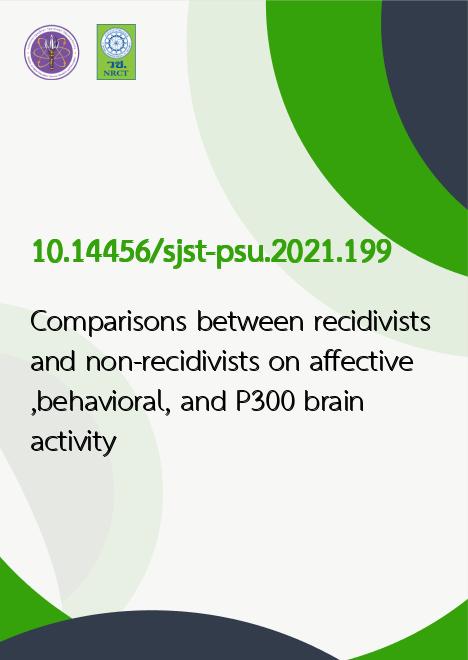
|
Comparisons between recidivists and non-recidivists on affective,behavioral, and P300 brain activity |
|---|---|
| รหัสดีโอไอ | |
| Creator | 1. Naruemon Intamuen 2. Apitchaya Chaiwutikornwanich 3. Vorasith Siripornpanich |
| Title | Comparisons between recidivists and non-recidivists on affective,behavioral, and P300 brain activity |
| Publisher | Research and Development Office, Prince of Songkla University |
| Publication Year | 2564 |
| Journal Title | Songklanakarin Journal of Science an Technology (SJST) |
| Journal Vol. | 43 |
| Journal No. | 5 |
| Page no. | 1527-1534 |
| Keyword | aggression, callous-unemotional traits, EEG, P300, recidivism |
| URL Website | https://rdo.psu.ac.th/sjst/index.php |
| ISSN | 0125-3395 |
| Abstract | The evidence from previous studies showed that frequent exposure to violent media or circumstances affects anindividual's desensitization to violence, aggression, remorse, and leads to psychopathy in adult life. However, studies of arecidivist's brain activity have not been much explored. Thai male students (N=43) aged 1835 years were included. The malerecidivist group participated in violent circumstances of two or more times. Both recidivists (n=21) and non-recidivists (n=22)were undergone ERP recording while conducting the three series of tasks. The target ERP generated in these tasks were the P300wave recorded over Pz electrode sites. The recidivists showed significantly smaller P300 amplitude than the non-recidivists whenresponding to target stimuli in three series of tasks. In addition, the recidivists had significantly higher score of physicalaggression, uncaring, and callousness than the non-recidivists. Reduced P300 amplitude correlated to high physical aggression,uncaring, and callousness on the recidivist group. |
